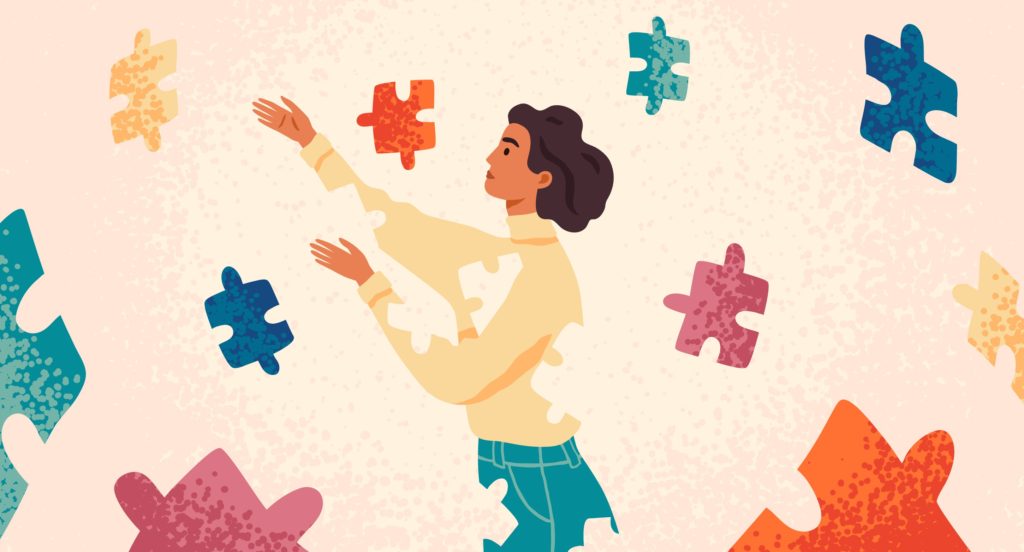
The self-help industry has become incredibly powerful, particularly in the field of mental health. There are now countless books, podcasts, TED talks, audiobooks, blogs, and the like, all trying to teach you how to live your best life. We’ve highlighted some of the ideas in previous posts, including self-compassion, mindfulness, and meditation, along with books like Lost Connections and Recovering from Emotionally Immature Parents.
There’s nothing inherently wrong with the industry or the advice that it offers. Indeed, personal growth can be important and self-help books are much less expensive than years of therapy (that still might not get you anywhere). But, most advice doesn’t offer a holistic mental health focus at all.
Instead, you get authors and speakers that advocate very specific techniques. They often have a specific framework that they’re working with, along with plenty of anecdotes and evidence.
It can all be incredibly convincing – and very limiting.
Here’s the thing. There is no single model or technique that will fix every problem. How could there be? Life is complicated and messy, as are we.
People also respond differently. Take mindfulness as an example. Many people find that mindfulness is liberating and helps them to step back from their emotions. The practice may even help with their depression or anxiety. Yet, for a small group of people, mindfulness appears to make depression and anxiety worse, not better.
This doesn’t make mindfulness ineffective, not at all. Instead, it’s a reminder that you need to consider and apply techniques with discrimination – filtering them through your own situation and needs.
In this post, we’re taking a look at how you can do so in practice, along with a selection of approaches that can help with your mental health, especially as a caregiver.
What is Holistic Mental Health?

The word holistic refers to the whole body. It means that you’re taking all of you into account, including your body, your emotions, your environment, your social connections, and everything else.
Holistic approaches are important because we’re not islands. We’re influenced countless things, including our histories, our values, any trauma we’ve experienced, and the people in our life.
Holistic mental health has two main areas.
The first involves using multiple approaches and techniques, rather than trying to find a one-size-fits-all option. Sometimes this even involves using approaches that seem to contradict one another – like mindfulness and cognitive behavioral therapy.
The second is to focus on your whole body (similar to how holistic pain management doesn’t just target the site of pain). After all, your physical health and mental health are strongly related to one another.
Beyond this, there are some other important principles to be aware of.
Key Holistic Principles for Caregivers
Don’t Expect to ‘Solve’ Everything
As we mentioned earlier, life is messy – as are people and emotions. You’re never going to be able to put everything in its place or feel good all the time.
In fact, the best approaches for mental health are the ones that fully recognize the messiness of being human and teach you how to be okay with not being okay.
Try New Things – Lots of Them
There are countless self-help books and mental health practices out there.
The only way to know which ones will work for you is to try them.
While you can turn to blogs, TED talks, and YouTube videos, I always suggest starting with books. Books are powerful because authors have the chance to delve deeply into their topic. They can get nuanced and specific, which just isn’t possible in a 1,000-word blog post or a 20-minute YouTube clip.
Many authors will also talk when their approach is powerful and when you may need to try something else instead.
Pay Attention to Yourself

No one knows you better than you do.
You’re the only one who truly knows how you feel and how you respond to different techniques. Trust your sense of yourself over everything else.
This is crucial.
After all, self-help books are written for a general audience. Even therapists, educated as they are, have gaps in their knowledge. They’re also dealing with an ever-changing field. For example, homosexuality was defined as a mental illness until 1973 and researchers are only just starting to realize that some people can’t visualize, which could influence their memories and ability to imagine as well.
Caregiving comes with its own complexities as well, ones that can make it difficult to draw boundaries or meet your own needs.
You’re the only one who knows your mind, your emotional responses, or your situation. As such, you need to make the final call. Look for the things that feel right to you. The ones that resonate and fit your needs.
These areas all mean that you must listen to yourself. If a technique doesn’t work its creator thinks it should, that’s okay. It doesn’t mean that you’re a bad person or that you’re not trying hard enough. Sometimes, often perhaps, what they’re proposing just isn’t right for you at this moment.
Why is listening to yourself so important?
One factor is the opportunity cost. If you’re spending a lot of time trying to force an idea or technique that isn’t a good fit, then you’re not putting that time into an approach that may be powerful.
The other factor is that you may do yourself harm. For example, while meditation is generally safe and beneficial, some people experience significant side effects, including anxiety and even psychosis. Such side effects are a sign to be gentle or perhaps even stop meditation entirely. Going to an intensive meditation retreat, on the other hand, would be a bad idea.
Look for Authors and Speakers You Connect With and Trust
Books and videos are fantastic learning tools, especially if you’re looking at something very new. However, authors and speakers vary dramatically from one other.
Learning something new is much easier if you find a writer or speaker who you connect with, one who you trust and find easy to understand.
For example, when I was researching boundaries for my upcoming book, I came across multiple authors who tackle the topic. They were all objectively ‘good’ and covered many of the same points, but some engrossed me instantly, while others were a challenge to read.
- I started with Boundaries by Henry Cloud and John Townsend, which was easy to read and used plenty of real-life examples. Honestly though, the heavily Christian focus of the book was overwhelming and not at all helpful (even though I am a Christian).
- Boundaries by Jennie Miller and Victoria Lambert was a non-starter for me, as the early chapters were heavy-handed with visualization exercises and I’m aphantasic, so I can’t visualize whatsoever.
- Setting Boundaries with your Aging Parents by Allison Bottke was fascinating. It had the same strong Christian focus as the book by Cloud and Townsend, but all the caregiving-specific examples more than made up for that limitation.
I won’t keep going, as I’m sure you get the picture. Not surprisingly, some of the books that I struggled with were very well-reviewed, which highlights the point that we’re all individuals and have our own needs.
Also be wary of any authors that suggest their approach is the only one. It’s not. Life isn’t as black and white as that. There are multiple viable approaches for any given situation.
Different Situations Call for Different Approaches
Changing your approach based on the situation is logical. Yet, it’s surprisingly easy to forget to do so.
One problem is that each new idea sounds amazing. Many are even presented as complete solutions.
Mindfulness is a great example of this. The practice has many benefits and is even being picked up by businesses as a way to promote productivity. Yet, while mindfulness can decrease stress, it also means that you’re retreating from challenges into a meditative state. This isn’t such a good outcome for situations where you need to critically think and solve problems.
As a caregiver, there will be times where you need to be self-compassionate and mindful of your emotions – and other times where you need to intentionally shift your emotional state because there’s a crisis going on that needs all of your energy.
Possible Additions to Your Holistic Mental Health Toolkit

Having multiple techniques and tools at your fingertips is an important part of holistic mental health. Think of this like having a holistic mental health toolkit.
Mindfulness, for example, might be a hammer. A hammer is a fantastic tool for many situations, but it’s not always the right choice. Someone with a variety of tools at their fingertips is going to have much better outcomes than someone who only owns a hammer.
Similarly, learning and understanding a variety of ideas gives you more tools to play with. Supporting yourself becomes much easier when you have many options.
The following sections provide a brief introduction to some useful techniques, along with links for where you can learn more.
Mindfulness
Mindfulness has now become incredibly popular, with countless books, apps, and tools all aiming to teach the practice. While there is no single definition for mindfulness, an often-quoted one is as follows:
“Mindfulness is awareness that arises through paying attention, on purpose, in the present moment, and non-judgmentally.”
In essence then, mindfulness is a way to accept and embrace your current experience, regardless of whether that experience would be classically defined as good, neutral, uncomfortable, or bad.
The technique is a powerful one – and a good reminder that most of our suffering doesn’t come from what is happening in any given moment, but from our stories, assumptions, and projections instead.
There are many interesting books on mindfulness, including the following ones:
- Practicing Mindfulness by Matthew Sockolov
- A Mindfulness-Based Stress Reduction Workbook by Bob Stahl and Elisha Goldstein
- Mindfulness in Plain English: 20th Anniversary Edition by Henepola Gunaratana
You can also turn to mindfulness and meditation apps. Many of these have specific meditations for beginners that are designed to ease you into the experience.
Acceptance and Commitment Therapy
Acceptance and Commitment Therapy (ACT) uses features of acceptance and mindfulness, along with strategies for changing behavior. A core feature is the idea of experiencing unpleasant feelings without over-reaction and without the sense that negative feelings are ‘wrong’.
Russ Harris has written a fantastic book on the topic called The Happiness Trap. This is an excellent place to begin learning about ACT, especially as the book is very easy to read.
As the name suggests, The Happiness Trap starts off with the idea that many of us get stuck in the idea of always searching for happiness and good feelings – and manage to make ourselves miserable in the process.
Mindful Self-Compassion
Mindful self-compassion is another variation on the idea of mindfulness. Kristin Neff is one of the main researchers and writers in this field. Her approach has three main principles:
- Mindfulness
- Common humanity, which refers to the way that all people are flawed, are a work-in-progress, and make mistakes
- Self-compassion. This focuses on being compassionate to yourself, just like you would to other people. Kristin Neff argues that many of us are quick to be compassionate to other people, but slow to do so to ourselves.
The Mindful Self-Compassion Workbook by Kristin Neff and Christopher Germer is the perfect place to learn more about the topic. There is even a chapter that specifically focuses on self-compassion for caregivers.
Kristin Neff has also recently published a new book called Fierce Self-Compassion. While I haven’t read this one myself, it looks promising. In it, Kristin is incorporating a new element of fierceness to her model, showing how self-compassion can be empowering for women, helping them to claim their power.
CBT and REBT

Cognitive behavioral therapy (CBT) and rational emotive behavioral therapy (REBT) are similar therapeutic approaches. They both suggest that human emotions are primarily created from beliefs, attitudes, and thinking, rather than by events. As such, it’s possible to change emotions and behavior by altering the way a person thinks.
While CBT is the more common approach, REBT has some interesting advantages. One difference is that it distinguishes between helpful and inappropriate negative emotions. It also talks about the idea of secondary disturbance, which is akin to being upset about being upset, and can make things much more difficult.
CBT and REBT are best undertaken with a therapist. However, there are self-help books that can help you step through the approaches yourself, including the following ones:
- How to Stubbornly Refuse to Make Yourself Miserable About Anything. Yes, Anything! by Albert Ellis
- Cognitive Behavioral Therapy Made Simple by Seth J. Gillihan
- The CBT Toolbox by Jeff Riggenbach
While mindfulness and CBT/REBT seem like contradictory approaches, both have their place. In particular, CBT or REBT may be powerful if your thoughts or emotional responses are unhealthy and/or are causing harm. If, however, what you’re feeling is normal and suitable for the situation, mindfulness may be a more valuable approach.
Caring For Your Body
We’ve highlighted a few mental techniques (and there are plenty more out there). Don’t forget though, we’re talking about holistic mental health here.
This means that you can’t just focus on your mind. You also need to care for the rest of you. This includes eating well, getting plenty of exercise, practicing self-care, avoiding burnout, and keeping up with your social connections.
Final Thoughts
Many caregivers struggle with their mental health. That’s hardly surprising. When you spend so much time supporting someone else, often there isn’t much left over for you.
Thankfully, it doesn’t have to be this way. It is possible to be resilient and thrive as a caregiver, even if your situation is incredibly overwhelming.
The ideas covered in this post are a useful starting point for doing so.
I have, however, only skimmed the surface, as this is a complex topic and there is much more to be said.
Stay tuned though, as this isn’t the last time we’ll talk about holistic mental health for caregivers. The topic will get addressed in much more depth in an upcoming book that we’re publishing. You’ll hear more about it as the completion date gets closer.

Leave a Reply